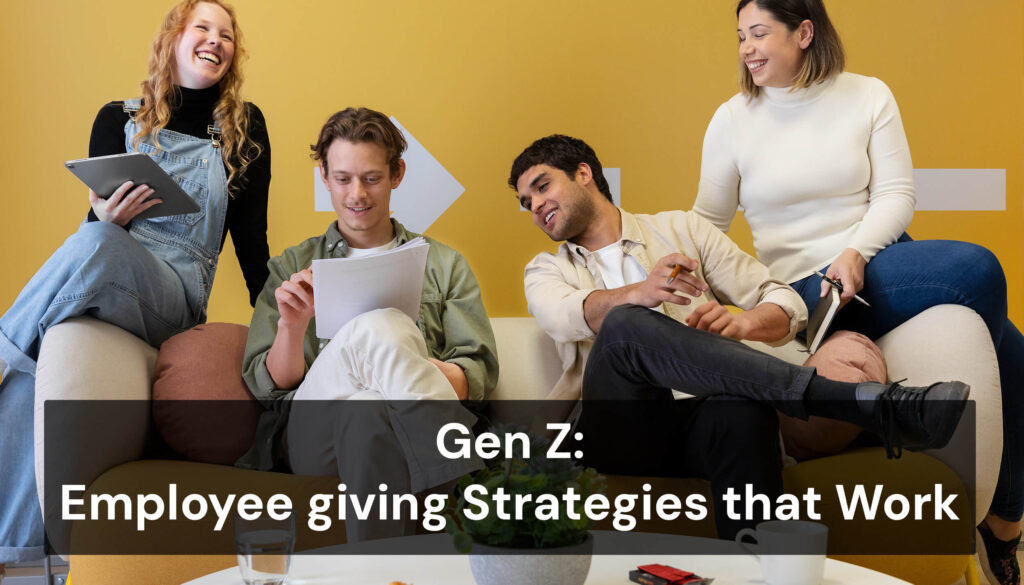Employee giving Strategies for Gen Z that Work

Generation Z is redefining the landscape of corporate social responsibility. They’re a generation driven by purpose, ready to change the world. These young adults aren’t just looking for a paycheck; they’re seeking out companies that share their passion for social good. It’s time to step up and offer opportunities for meaningful impact.
Making Corporate Giving Matter to Gen Z
Let’s face it – Generation Z isn’t just bringing their smartphones and TikTok/Instagram habits to the workplace. They’re bringing something far more powerful: a genuine desire to change the world and can contribute in reshaping workplace philanthropy.
As per the Blackbaud’s survey, 84% of the Gen Z are giving back to the society in any of the 3 T’s Way
- Time (Volunteering)
- Treasure (Monetary)
- Talent (Skilling & Advocacy)
Why This Matters Now
Gone are the days when a simple donation box in the break room cut it. Gen Z employees want to see real impact, and they want their employers to step up in meaningful ways. They’re not just asking “What’s my salary?” but “How can I make a difference here in the organization?”
Making It Work: 7 Strategies That Actually Connect
1. Keep It Digital, Keep It Real
Gen Z has never known a world without smartphones – so why should workplace giving be stuck in the paper age? The key is making giving as easy as sending a tweet, but with complete transparency about where every dollar goes. When employees can track their impact in real-time (just like tracking a delivery order), they’re more likely to stay engaged.
2. Walk the Talk on Social Impact
Here’s the truth: Gen Z can spot empty corporate promises from a mile away. They want to see their employers genuinely committed to causes that matter – whether it’s climate action, social justice, or community development. The magic happens when companies align their giving programs with the issues their younger employees are passionate about.
3. Flexibility is Everything
Working hybrid? So should giving be. The most successful programs we’ve seen offer a mix of virtual and in-person opportunities. Maybe it’s coding for a nonprofit from home one day, and planting trees in the local park the next. The key is giving people choices that fit their lives.
4. Make It Part of the Growth Journey
Let’s get real – professional development doesn’t have to mean another Zoom workshop. When employees can use their actual job skills to help nonprofits, something amazing happens. A marketing pro might help a local shelter with their social media strategy, or a developer might build a website for a community organization. It’s a win-win: the community benefits, and employees grow their skills in meaningful ways.
5. Build Real Community Around Giving
Nobody wants to feel like they’re giving in a vacuum. The most engaging programs create a sense of community – celebrating collective wins, sharing stories of impact, and making every contribution feel part of something bigger. Think less “corporate initiative” and more “movement for good.”
6. Think Beyond the Wallet
Money matters, but Gen Z wants to roll up their sleeves too. The most successful programs blend traditional giving with hands-on volunteering and advocacy. It’s about creating multiple pathways for people to contribute in ways that feel authentic to them.
7. Make It Personal (Really Personal)
Cookie-cutter approaches don’t work with Gen Z. The best programs let employees connect with causes they personally care about, then recognize their contributions in meaningful ways. It’s about helping people write their own giving story, not following a corporate script.
Looking Ahead
The future of corporate giving isn’t about fancy platforms or flashy programs – it’s about creating authentic ways for employees to make a difference. When companies get this right, something remarkable happens: giving becomes less about corporate social responsibility checkboxes and more about building a community of purpose-driven people who genuinely care about making an impact.
For companies willing to evolve their approach, the rewards go beyond employee retention or brand perception. They’re building a legacy of positive change, powered by a generation that’s ready to put their values into action.
Takeaway: Gen Z doesn’t just want to work for a paycheck – they want to work for purpose. The companies that understand and embrace this aren’t just future-proofing their giving programs; they’re helping shape a more conscious and caring corporate world.